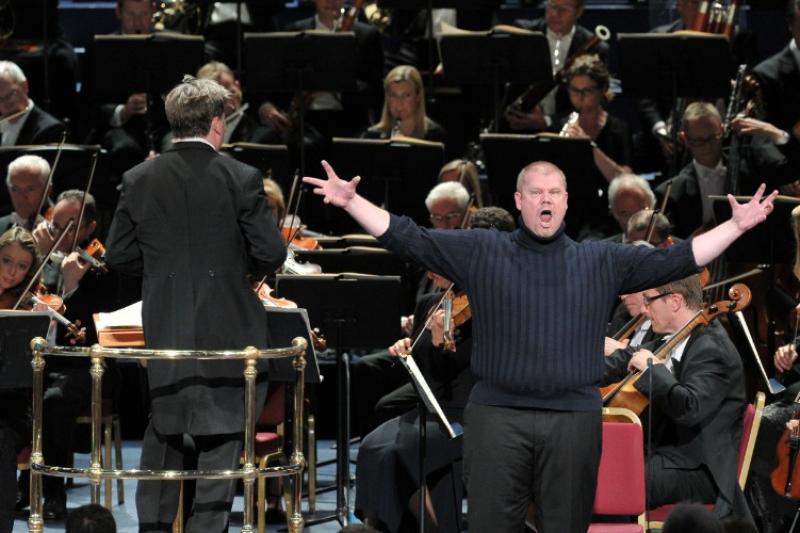BBC Proms: Peter Grimes, English National Opera/ BBC Symphony Orchestra, Knussen | reviews, news & interviews
BBC Proms: Peter Grimes, English National Opera/ BBC Symphony Orchestra, Knussen
BBC Proms: Peter Grimes, English National Opera/ BBC Symphony Orchestra, Knussen
Stuart Skelton shines in the Britten opera and Claire Booth rescues Debussy

After the all-singing, all-dancing, all-helicoptering brilliance of Stockhausen Mittwoch aus Licht, the dry routine of an opera in concert didn't seem a very enticing prospect. That's the problem with this year's Cultural Olympiad. We're becoming very spoilt by it. What should have been a mouth-watering prospect - a fantastic cast performing a great opera - suddenly began to feel run-of-the-mill when compared to the once-in-a-lifetime event that was Mittwoch.
I saw and loved the original ENO production of Peter Grimes, Benjamin Britten's brilliant cautionary tale about little England. And, though the ENO didn't do as much as other companies often do to resurrect the look and feel of productions that they're bringing to the Royal Albert Hall, the cast retained as much of the dramatic tension and surreal character of the original David Alden staging as they could. Memories of the production were strong, however. And I began to yearn for some visual activity in the First Act, where the lack of dramatic momentum in the libretto slightly drags.
We mustn't forget the townsfolk. They make this opera
Then again, who needs sets when you have Ed Gardner and the ENO Orchestra. His shaping of the music was vivid, alert, muscular and magisterially long-sighted. This was music one could see as well as hear. The surety of the orchestra no doubt helped the cast and the choir focus on delivering the complexities of the drama so compellingly and fluently.
With Amanda Roocroft far from her best as Ellen Orford (Grimes' champion), the night belonged to Stuart Skelton's Peter Grimes, whose eloquence and elegance of voice was breath-taking and whose characterisation couldn't have been bettered. The paralysing confusion that grips Grimes as misfortunes and mistakes push the village into a witch hunt against him was played without cliche or extremity and touched us all.

We mustn't forget the townsfolk. They make this opera. And the ENO Chorus (under the direction of the chorus master Aidan Oliver) delivered every blast of indignation, nosiness and hypocrisy with brilliantly committed and authentic little Englander venom.
The story of what happened next in British 20th-century composition was the subject of last night's Prom. Composer-conductor Oliver Knussen offered us a piece of ballet music from Alexander Goehr, a new work from one of our brighter younger things, Helen Grime, and one of his own symphonies, the third, next to some little heard ballet music by Claude Debussy, The Martyrdom of St Sebastian.
Only some delicious singing from Claire Booth stopped me from nodding off completely
Unusually for Knussen, it was a ragbag collection, the quality of the music fluctuating between (as well as within) the works. Connections were hard to find. Shortness alone seemed to link Knussen's precocious Third Symphony, written when he was in his early 20s, and Grime's new orchestral nocturne, Night Songs. Shortness, and perhaps also immaturity. The sure-footedness and generosity that is such a characteristic of much of Knussen's output wasn't yet there when he wrote this piece. Too much gets lost in elliptical cleverness and compactness.
Everything was lost on Knussen in Grime's work. His glasses, he informed us, had slipped off his nose during the performance and he had no idea what had been going on. "I think everything went ok but I'd like to perform it again just to make sure," he said. Normally a work benefits from a second listen. With this one, it simply served to reaffirm the fact that this was a very neat, very careful and very safe little work, with a cute little rhythmic motor and a not unpleasant melody.
The maundering ways of Debussy's dance piece on the martyrdom of St Sebastian, you really have to be in the right mood for. If, as with me last night, you're not, you can begin to feel like a martyr yourself. You also start to wonder what Debussy was playing at, allowing such long stretches of music to brood so interminably over such thin material. Was the tortuousness deliberate? Was it his way of trying to impress upon us Sebastian's plight? Or was he just having an off day? Only some delicious singing from Claire Booth stopped me from nodding off completely.
Praise be, then, to Sandy Goehr. Though it gets a little clogged half way through, his Metamorphosis/Dancefrom the early 1970s was clear and jaunty and full of interesting coloristic effects. Now here was a piece that deserved a second hearing. If only someone had knocked Knussen's glasses off.
Share this article
The future of Arts Journalism
You can stop theartsdesk.com closing!
We urgently need financing to survive. Our fundraising drive has thus far raised £49,000 but we need to reach £100,000 or we will be forced to close. Please contribute here: https://gofund.me/c3f6033d
And if you can forward this information to anyone who might assist, we’d be grateful.

Subscribe to theartsdesk.com
Thank you for continuing to read our work on theartsdesk.com. For unlimited access to every article in its entirety, including our archive of more than 15,000 pieces, we're asking for £5 per month or £40 per year. We feel it's a very good deal, and hope you do too.
To take a subscription now simply click here.
And if you're looking for that extra gift for a friend or family member, why not treat them to a theartsdesk.com gift subscription?

Add comment